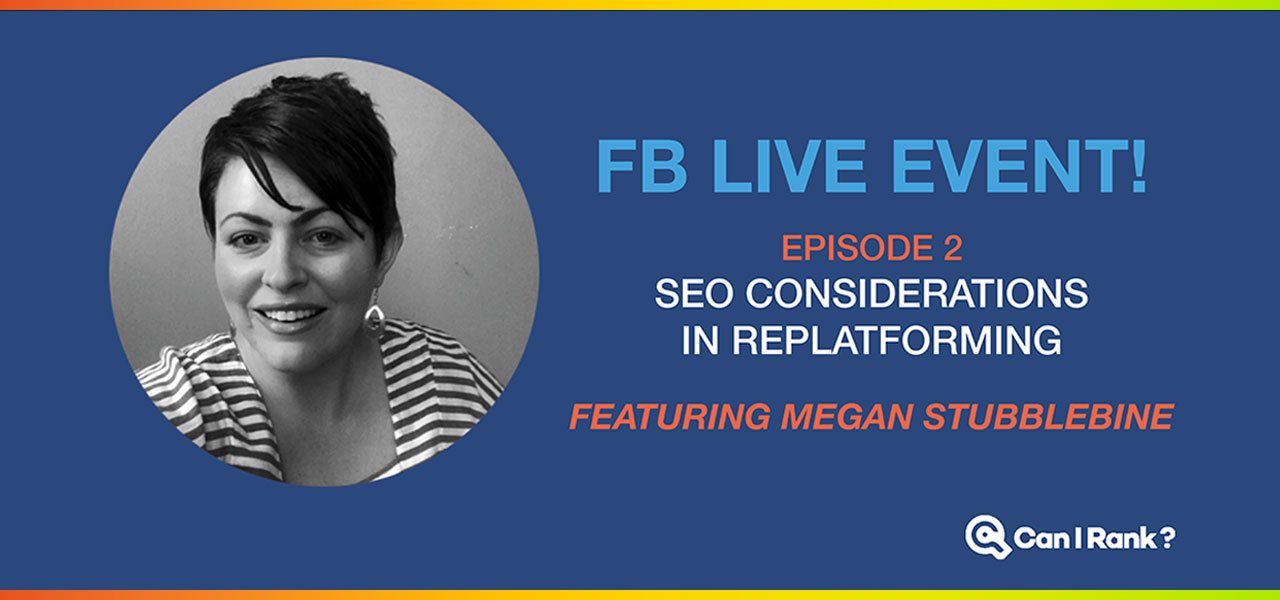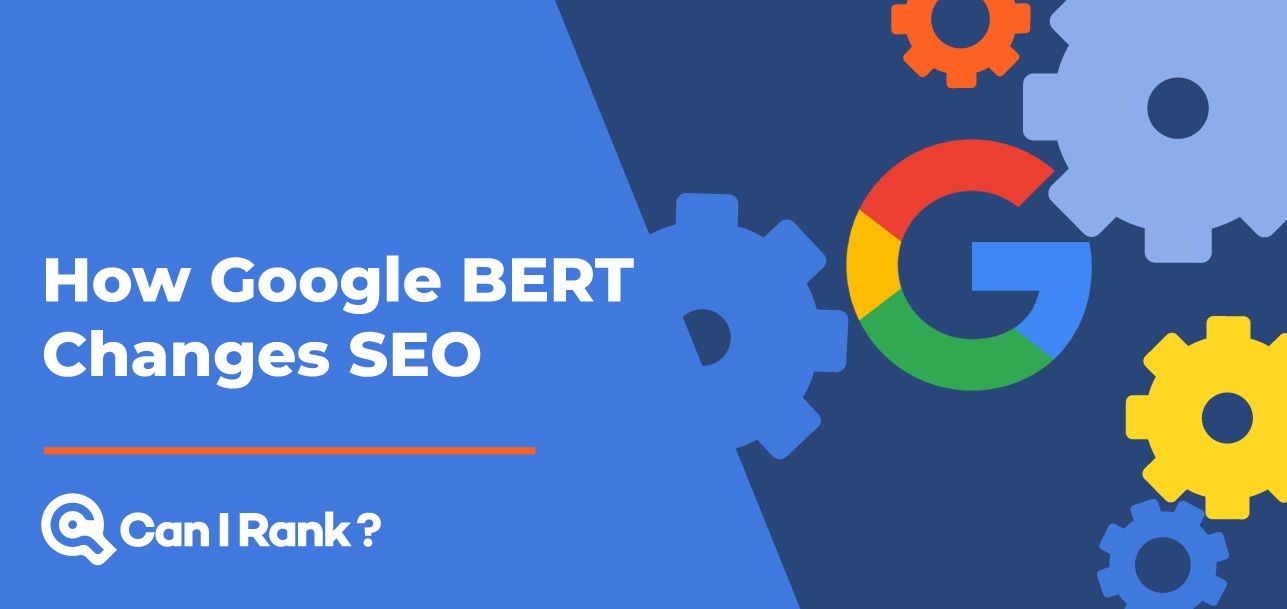Transcript:
[00:01:01] Jonathan Greene: Ladies and gentlemen, it’s time for the SEO Domination podcast. I feel good. I’m having a good beard day. How do you feel, Megan?
[00:01:08] Megan Stubblebine: I’m feeling good. Today’s a good day.
[00:01:10] JG: Good. My guest today is Megan [Stubblebine]. She’s the vice president of Client Relations at CanIRank. Also, [she’s] a very talented, very well-rounded marketer who has impressed the heck out of me at all opportunities to do so with her general knowledge of marketing and SEO in particular. So welcome to the show! We’re going to talk about SEO considerations and replatforming which, if you know anything about it, is a veritable landmine. You can completely tank your business if you do this incorrectly. In the modern marketing economy, I think it’s more of a “when” rather than “if” you have to replatform, because things change so rapidly and platforms evolve, and you find that old TypePad blog you had in 2004 doesn’t really work so well anymore for you, so you have to upgrade.
[00:02:03] JG: So let’s just jump into this thing. We try to talk to people who are perhaps a little more savvy on SEO, but let’s start for the noobs who may be tuning in. So tell me: what is replatforming? What are we even talking about here?
[00:02:20] MS: Sure. So when we talk about replatforming, we’re really talking about the software that’s delivering or managing the site, and switching that around. A lot of times, maybe you’ll see people go from Shopify to WordPress, or WordPress to Shopify. That’s just a simple example. A lot of times with a replatform, your URLS are going to change, your navigation is going to change — really everything technical related to that may change as well. The most common ones that we see are frustrated business owners who don’t have the ability to edit their site the way that they need to. Or maybe a small e-commerce shop that just wants to add more products, or have a better point of sale, and they don’t have that right now.
[00:03:15] JG: Absolutely. You’ll be surprised how many of these full-service platforms don’t even allow custom code injections, for instance. As a digital marketer, that will be enough for me to replatform right there.
[00:03:27] MS: Yes, yeah.
[00:03:29] JG: We’re talking about basically anybody who needs to change the platform upon which their website is served for any reason. Has CanIRank had any success with replatforming people? Like why should I care what you have to say?
[00:03:42] MS: Absolutely. I guess we wouldn’t be on here talking about it if we had no idea what we were doing. We have had a lot of success working with our clients through the replatforming process, [including] lots of different clients from service based businesses to e-commerce brands. It really doesn’t matter. One really good example was UrbanAsh.com. This was a realtor who worked with us for quite a while. This is a good example because it’s a really extreme example. They changed the domain name. They changed their site platform, meaning all of their URLs changed, between the name of the site and actually changing the platform. We worked with them to really plan that out. We helped them develop the new site structure, so what is going to be in my navigation, what keywords are we going to use, what is the organization at the site, etc. We were able to get in there and optimize the pages before launch. It’s always great to have that leg up in terms of SEO before you launch the site. We were able to manage the technical side of things, so here we’re talking about redirects and all that fun [stuff]. And [we also did] some promotion and strategy and planning for after the migration as well. They saw a brief dip for a few weeks, which is super common with migrations. You pretty much always expect that. But within about three to four months, they had tripled the traffic that they had before. Replatforming can really be a wonderful thing for a business as long as it’s done correctly.
[00:05:32] JG: So you’re telling me that I shouldn’t wait until after I replatform to start thinking about the implications on the traffic.
[00:05:37] MS: No.
[00:05:37] JG: You Heard it here first, folks. Don’t wait. But that begs the question then: at what point in the process should I involve someone who has SEO experience in terms of thinking through what are the implications of doing these changes.
[00:05:52] MS: Sure. So honestly I would say as early as possible. Maybe you’re thinking that’s easy for you to say [because] this is what you do. But really, a lot of the decisions that are going to be made early on in this planning process will affect SEO. It will affect SEO that you’re working on right now, and it will affect it far into the future depending upon how long you plan to use this as your new website. Getting an SEO involved very early on in the process is pretty crucial, even if you only decide to consult with them or something along those lines. Some of the reasons for that is even the platform that you’re choosing could have an impact on your SEO. How customizable is it? What is the default URL structure and are we able to change those things? How are we going to organize the site? All of those things are super early decisions that SEO affects. There’s a huge impact there, so we want to be a part of that decision-making process.
[00:07:01] JG: Sure. So your marketing team, and in particular your SEO experts, really need a seat at the table for this. I have a sneaking suspicion that a lot of marketers approach this as more of a branding issue or more of a collateral issue, like a design issue, as opposed to a real hardcore marketing issue. I think that might be incorrect because of the level of technical approach that needs to be considered in order to make sure you don’t tank your traffic while doing it.
[00:07:30] MS: Yeah, I think there’s a lot are going on there, and like you said, the way you phrased it — just having a seat at that table, being able to collaborate with the in-house marketing team and the development team and the designer, and being a part of that conversation is so important.
[00:07:46] JG: Yeah. Because it’s not just link structure. I think when designers are uploading images and working on the structure and look of the site, they need to be thinking about all sorts of things that average marketers who are not SEO brains don’t think about, like alt tags and image titles. There’s all sorts of considerations.
[00:08:04] MS: Absolutely.
[00:08:05] JG: Tell me how to do this then. Give me a top of the heap, like what’s the single most important factor to consider?
[00:08:18] MS: Yeah. When you’re replatforming, if you do nothing else and you don’t consult an SEO for anything else at all, [consult them for] your redirects. Please, please, please get your redirects correct. Why do you need a redirect? If you’re changing your your URL structure at all, if you’re eliminating pages, if you have products that you’re not going to keep, you’re going to move your blog, whatever that is — if that URL structure is changing or going away, we need to redirect those pages. Redirects are really important because your rankings are tied to those pages, and you have links pointing to those pages, which are super important and really hard to earn. You would never want to lose any of the power that they’re bringing to your site. In terms of some of the technical things, we always recommend to do 301 redirects and not 302s, because 301 is a permanent redirect and a 302 is temporary. So always 301. When you can use regular expressions for redirects, it’ll help you with your number of required redirections. Basically, if you’re new to this and you’re thinking about it, you have a list of all the URLS on your current site and then you have a list of what all the new URLS are going to be on your new site, and you need to map them, [either] one to one or to the closest related page. Sometimes this can get really cumbersome because maybe it’s a really big web site, [and] you’ve got a ton of products [and] content. So that’s when if you can use regular expressions, it’s a good shortcut. Even with the best redirect plan, things are going to slip through the cracks. After you replatform and launch a new site, you really want to be watching search console closely, seeing if you’re getting some errors. Make sure you have a user-friendly 404 page. A 404 page is when if you ever go onto a website and, whoops, it’s not here anymore, or this product is all gone, etc, that page should be able to direct your user back to another relevant product or a home page — wherever you want to send them. Just some tricks there, but I would absolutely say redirects. I think sometimes they get overlooked. It’s been my experience that they can get overlooked in the development process if you don’t have a SEO on your side. So I would absolutely make sure that those are done correctly.
[00:11:21] JG: That’s a lot of really technical stuff. So let’s say I’ve botched this all up. I’ve already messed it up. What do I do now?
[00:11:41] MS: Oh boy. There are a few things to look for. A lot of times what happens, especially for someone running a smaller web site, if you’re kind of a sole proprietor or you have a small business, you’re not sure that you’ve messed up your replatforming. Some things that may indicate an issue when looking in search console and looking for errors is that you all of a sudden have a big influx of 404 errors. You’re going to see, after a little bit of time, a major loss in rankings, if you’re tracking rankings; some pages [might be] dropping out of the index, that’s your numbers index pages; and then, of course, impressions to your site and traffic in general — organic traffic. The one caveat there is that a small dip after a replatform is pretty normal. We expect to see that. [Replatforming] is kind of a shock to the system. It’s a big deal [because] you just kind of made all these changes. And so usually we do see a little bit of a dip, but major and persistent losses in rankings and traffic is obviously an issue. Sometimes we also see an impact on conversions, because maybe we got the redirects right and we got all that technical stuff right, but we didn’t get the user experience end of it right, and they’re not able to navigate properly through the site or they’re just not understanding your calls to action or finding what they’re looking for. That’s kind of a part of it as well.
[00:13:18] MS: So let’s say that you’ve diagnosed that your replatforming just didn’t go well, I would say again often it’s the redirects. There was a mess there. What you want to try to do is mitigate your loss. Can you still do the redirections and can you save your — we call it “link juice” — so the links that we’re pointing to those pages. Can you save them? Going through and trying to work through that. Oftentimes an SEO consultant or agency can help you with that. So that would be step one. Another thing would be looking at your backlink profile for deadlinks. Were there links there that existed that just aren’t there anymore? Or were they not redirected? Or we can’t redirect them now? Sometimes you can reach out to those people and try to get that changed. And, honestly, sometimes it’s so bad that you might have to head back to the drawing board and start reviewing your information architecture, which is the layout of your site. It’s time for a new link building campaign or promotion campaign to try to kind of recoup some of what you lost. It really can be quite detrimental if you botched it. But you can work through it. It will take time and you will need to engage what I would call a technical SEO to help you through some of this.
[00:14:50] JG: Well, that sort of leads me to another question. Henry wants to know: “What tools do you recommend using during a replatform?” I think it’s actually a great question because a lot of what you just said about checking link structure and stuff may not be intuitive.
[00:15:07] MS: Right. Right. OK. In terms of looking for issues or errors for issues with your traffic, the two easiest things that you can use there are Google Search Console and Google Analytics. They’re free tools. They’re easy to install. If you have a web site, you should definitely be using them and have them installed on your site. That’s number one. I would say that the second thing, if you’re going to dive into some more technical stuff where you’re going to try to plan out your redirects, Screaming Frog is an amazing tool. It’s a spider; it’s an SEO spider. I know has a funny name.
[00:15:53] JG: I think that’s just about the raddest name I’ve ever heard.
[00:15:58] MS: Yeah. It’s amazing software. What it does is it crawls your site just like Google or another search engine would, and it spits out this huge report of all of your URLs and any errors that it finds, your titles, your meta descriptions, your H1s, your image sizes — anything you can think of. It spits this all out. And I know that may sound a little intimidating if you’re not sure what you’re looking at, but there’s lots of tutorials and things like that. Screaming Frog is amazing. It can crawl your current site, and it can crawl a site while it’s in development. It’s really the best thing to use if you are looking to plan out these redirects yourself, or doing a technical audit of your site. You know, understanding what’s happening on it today, and then post launch, what’s happening on it after the fact. If you’re looking for some more link information or rank checking and things like that, I love the CanIRank tool. That’s awesome to use. Lots of good information there. And we also use tools like Ahrefs a lot. That’s really good at looking at your back profile as well.
[00:17:11] JG: Cool. So I’ve done all of that, complete with my replatforming. I’m done, right? There’s nothing else for me to do.
[00:17:19] MS: No.
[00:17:19] JG: What else do I need to do?
[00:17:20] MS: So once your replatforming is done, you’ve flipped the switch, and you’ve launched your new beautiful site, you’re going to want to audit for technical issues or really any issues. You’re going to be checking in search console, you’re going to be checking in analytics, you’re going to be crawling the site again using Screaming Frog like I mentioned or maybe another crawler, and just monitoring and seeing what’s happening. It takes some time for some of the errors to come through or for us to really recognize what’s going on. We at CanIRank have a whole pre- and post-launch checklist and real audit process that we go through to make sure that things are working the way we would expect them to be. Beyond that, then you really need to start getting into some fresh content and fresh promotion on the new site to really show Google that this is the place people want to be. It’s where they want to buy that new pair of shoes or that supplement, or want to learn about sleep health, etc. Fresh content and fresh links are huge indicators to Google. Google wants to see them going out. We want to get them indexed. We want to get them ranking. We can’t just stop there. We can’t just flip the switch and say, well, everything is going to be better now because I’ve got this new site. You have to continue your your SEO and your content and PR strategy beyond replatforming. And that strategy is really going to support you. I know we talked a little bit about that dip right after launch. That post-launch dip usually lasts a few weeks. This here is going to support you; that’s going to get you out of that dip faster, and it’s going to really make your results exponentially better, if you’re doing those things right as you launch as well.
[00:19:27] JG: So this is a technical task, but it’s not entirely technical. It’s like everything else; you have to support it with coherent strategy and the doing of things.
[00:19:37] MS: Yes.
[00:19:39] JG: Which is something to consider about a replatforming in general as well. Platforms are not magic. Some are better than others. They’re not all created equal. Ultimately if you put bad content on a really good platform, it’s still going to stink. So we have to always be cognizant of those things. So that’s great. That’s really fantastic information. I feel like I personally learned a lot sitting here listening to you talk about that. I want to do two things before we go: one, I want to let all these really cool people on the podcast ask us some questions; and two, I want to give you just a minute to talk about whatever you want to talk about. We can do your company, your job, whatever you have going on because I’m really appreciative of you coming on to be on the show. So here’s your minute. Everybody go ahead and queue up your questions. I’m going to give Megan a minute to say whatever she wants. Go.
[00:20:35] JG: OK. I don’t know what to say. Like John mentioned earlier, I’m the V.P. of Client Services with CanIRank. I absolutely love you know working with CanIRank, and I will say we’re probably the most honest, forthcoming group of SEOs that you’d ever really get a chance to work with. It’s pretty tremendous the depth of knowledge and talent that we have on our team. I feel super grateful for that and for that opportunity. On a more personal note, I don’t know how many of you out there have kids and are getting into that summer schedule, but man, it has been tough. Definitely feeling the struggle right now. Just kind of getting everybody transitioned onto new schedules, so may the force be with you if you’re with me on that one.
[00:21:30] JG: I have two kids: one of them’s an artist and one of them is a volleyball player. They’re in different camps all day. It’s craziness.
[00:21:39] MS: Yes.
[00:21:39] JG: Well, I don’t see any further comments, so I think you’re off the hook. I know what it means — it means that you so thoroughly explained the topic that no one could possibly conceive of a question to ask you that you didn’t already cover. I’m going to consider that a win, and listen, you’re a true professional with a wealth of knowledge. Thank you so much for coming on and doing this with me. I really, really appreciate it.
[00:22:06] MS: Thank you. Thanks for inviting me. I’m glad we got to talk a little bit about replatforming. If you would have asked me 10 years ago, I wouldn’t have said it’s one of my favorite topics, but at this point, it is definitely one of my favorite topics.
[00:22:19] JG: Outstanding. Well listen, Grumpy Cat says what’s up. I want all you guys to know it’s Friday, go out there and have a great weekend. Be safe. It’s getting hot and — some SEO stuff. If you need help, you know who to ask. Hope everybody has a fantastic weekend. Take it easy.




Great article!
Thank you Rolando!
Thank you for sharing excellent informations. Your web-site
is so cool. I am impressed by the details that you have on this blog.
It reveals how nicely you understand this subject.
Bookmarked this website page, will come back for more articles.
You, my friend, ROCK! I found simply the information I
already searched everywhere and simply could not come across.
What an ideal web site.
I love your content!